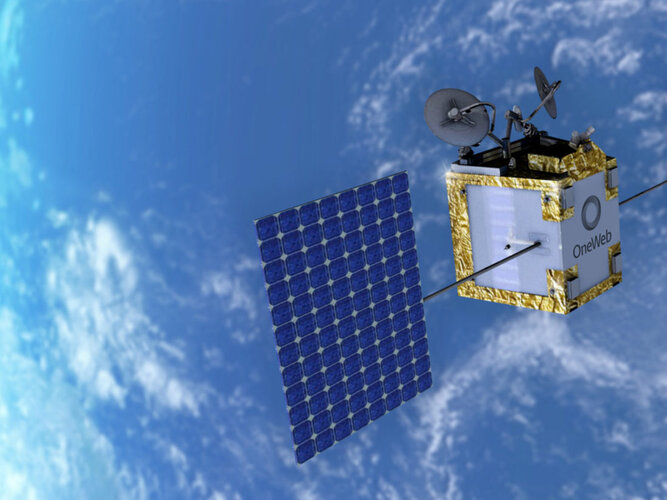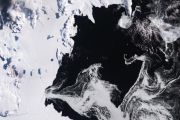
Copernical Team
Sustainable connectivity in space

The world’s first mission to remove several small telecommunications satellites from orbit once they reach the end of their operational service is about to start building and testing its prototype spacecraft.
Why haven't we discovered co-orbital exoplanets? Could tides offer a possible answer?
 In our solar system, there are several thousand examples of co-orbital objects: bodies that share the same orbit around the Sun or a planet. The Trojan asteroids are such an example. We have not yet observed any similar co-orbitals in extrasolar systems, despite discovering more than 5,000 exoplanets.
In a new study published in Icarus by Anthony Dobrovolskis, SETI Institute and Jack Lissa
In our solar system, there are several thousand examples of co-orbital objects: bodies that share the same orbit around the Sun or a planet. The Trojan asteroids are such an example. We have not yet observed any similar co-orbitals in extrasolar systems, despite discovering more than 5,000 exoplanets.
In a new study published in Icarus by Anthony Dobrovolskis, SETI Institute and Jack Lissa Blast a Knob: Sols 3485-3486
 The Sol 3483 drive completed as planned, positioning the rover near several outcrops of knobby material and more "normal" looking bedrock. The tactical uplink team discussed various options and decided to focus this plan's observations on the knobby material. Unfortunately, timing constraints precluded an APXS integration today, as the instrument temperature would be too high to provide high-qua
The Sol 3483 drive completed as planned, positioning the rover near several outcrops of knobby material and more "normal" looking bedrock. The tactical uplink team discussed various options and decided to focus this plan's observations on the knobby material. Unfortunately, timing constraints precluded an APXS integration today, as the instrument temperature would be too high to provide high-qua Debris from Chinese rocket reenters atmosphere, mostly burning up
 Debris from the last stage of the Long March-7 Y5 carrier rocket reentered the atmosphere at 5:34 p.m. on Wednesday (Beijing Time), the China Manned Space Agency said.
The vast majority of the device burned up during reentry and the debris fell into the sea, with the center of the landing area at a latitude of 37.5 degrees north and a longitude of 24.2 degrees east, according to an agency
Debris from the last stage of the Long March-7 Y5 carrier rocket reentered the atmosphere at 5:34 p.m. on Wednesday (Beijing Time), the China Manned Space Agency said.
The vast majority of the device burned up during reentry and the debris fell into the sea, with the center of the landing area at a latitude of 37.5 degrees north and a longitude of 24.2 degrees east, according to an agency Terran Orbital deploys 6 satellites from SpaceX Transporter-5 mission for multiple customers
 Terran Orbital Corporation (NYSE: LLAP) reports all six Terran Orbital designed and built satellites that launched on the SpaceX Falcon 9 rocket as part of the Transporter-5 mission have successfully deployed on their journey to Low Earth Orbit (LEO).
The Terran Orbital satellites include two NASA CubeSat Proximity Operations Demonstration (CPOD) vehicles,
Terran Orbital Corporation (NYSE: LLAP) reports all six Terran Orbital designed and built satellites that launched on the SpaceX Falcon 9 rocket as part of the Transporter-5 mission have successfully deployed on their journey to Low Earth Orbit (LEO).
The Terran Orbital satellites include two NASA CubeSat Proximity Operations Demonstration (CPOD) vehicles, Sidus Space selects L3Harris Mission Critical Operations Center Software for LizzieSat constellation
 Sidus Space, Inc. (NASDAQ:SIDU), a Space-as-a-Service satellite company focused on commercial satellite design, manufacture, launch, and data collection, is pleased to announce its selection of L3Harris Technologies (NYSE:LHX) InControl and OnTime software for command and control and mission planning for LizzieSat Constellation
InControl will provide satellite command and control software
Sidus Space, Inc. (NASDAQ:SIDU), a Space-as-a-Service satellite company focused on commercial satellite design, manufacture, launch, and data collection, is pleased to announce its selection of L3Harris Technologies (NYSE:LHX) InControl and OnTime software for command and control and mission planning for LizzieSat Constellation
InControl will provide satellite command and control software Satellogic launches 4 Satellites on SpaceX Transporter-5 Mission
 Satellogic Inc. (NASDAQ: SATL), a leader in sub-meter resolution Earth Observation data collection, reports the launch of four additional satellites from Cape Canaveral Space Force Station.
They were delivered to a sun-synchronous low-Earth orbit on SpaceX's Transporter-5 mission on May 25, 2022 onboard the Falcon 9 reusable, two-stage rocket, under SpaceX's Rideshare program. All four sat
Satellogic Inc. (NASDAQ: SATL), a leader in sub-meter resolution Earth Observation data collection, reports the launch of four additional satellites from Cape Canaveral Space Force Station.
They were delivered to a sun-synchronous low-Earth orbit on SpaceX's Transporter-5 mission on May 25, 2022 onboard the Falcon 9 reusable, two-stage rocket, under SpaceX's Rideshare program. All four sat NASA Supports Small Business Research to power future exploration
 NASA has selected hundreds of small businesses and dozens of research institutions to develop technology to help drive the future of space exploration, ranging from novel sensors and electronics to new types of software and cutting-edge materials. The newly awarded projects under the agency's Small Business Innovation Research (SBIR) and Small Business Technology Transfer (STTR) program also
NASA has selected hundreds of small businesses and dozens of research institutions to develop technology to help drive the future of space exploration, ranging from novel sensors and electronics to new types of software and cutting-edge materials. The newly awarded projects under the agency's Small Business Innovation Research (SBIR) and Small Business Technology Transfer (STTR) program also Geology from 50 light-years away
 Baltimore MD (SPX) May 27, 2022
With its mirror segments beautifully aligned and its scientific instruments undergoing calibration, NASA's James Webb Space Telescope is just weeks away from full operation. Soon after the first observations are revealed this summer, Webb's in-depth science will begin.
Among the investigations planned for the first year are studies of two hot exoplanets cla
Baltimore MD (SPX) May 27, 2022
With its mirror segments beautifully aligned and its scientific instruments undergoing calibration, NASA's James Webb Space Telescope is just weeks away from full operation. Soon after the first observations are revealed this summer, Webb's in-depth science will begin.
Among the investigations planned for the first year are studies of two hot exoplanets cla Extraterrestrial civilizations may colonize the Galaxy even if they don't have starships
 Astronomers have searched for extraterrestrial civilizations in planetary systems for sixty years, to no avail. In the paper published by International Journal of Astrobiology, Cambridge University Press, and titled "Migrating extraterrestrial civilizations and interstellar colonization: Implications for SETI and SETA," Irina K. Romanovskaya proposes that the search for extraterrestrial intellig
Astronomers have searched for extraterrestrial civilizations in planetary systems for sixty years, to no avail. In the paper published by International Journal of Astrobiology, Cambridge University Press, and titled "Migrating extraterrestrial civilizations and interstellar colonization: Implications for SETI and SETA," Irina K. Romanovskaya proposes that the search for extraterrestrial intellig 
































